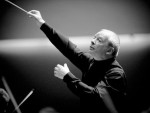Title
On March 19, British early music specialist Christopher Hogwood will lead Juilliard415, the student period-instrument ensemble, in works by Haydn and Francesco Geminiani. Hogwood, who guest conducts all over the world, is well known for his previous work with the Academy of Ancient Music and is now on the editorial staff of collected editions for C.P.E. Bach, Geminiani, and Martinu. In a recent telephone interview, he discussed the upcoming concert as well as Juilliard’s relatively new emphasis on historical performance.
Body
“It’s only very recently that Juilliard has been quite determinedly doing things that involve historical principles in the performance of Classical and Baroque music,” he said. “I think it’s very nice to bring some of the ideas that have been tried out and found good or bad in other situations and talk about them with Juilliard students who are covering the sort of ground and also to work with them in the context that leads up to a concert so it’s like normal life.”
The Juilliard415 program will include three Hadyn symphonies and three concerti grossi by Geminiani covering a large range of styles. Interestingly, though these two composers are generally thought of as being from different eras, these pieces were all written in 1761. Noting that history tends to be looked at “as a series of boxes, [with] Baroque in one box and Classical in the next,” Hogwood said, “then here is a strange program where Classical and Baroque are happening at the same moment. What happens to your boxes then? Maybe the answer should be that we hope people will stop thinking in boxes.”
The works of Geminiani have been of particular interest to Hogwood lately since he has been serving as the general editor of the Francesco Geminiani Opera Omnia, the composer’s collected works. Hogwood noted that while he is little-known today, Geminiani was as famous as Corelli or Handel in his own day, “and his music became semi-French, semi-Italian—and very curious. It’s hard to put your finger on what Geminiani is actually trying to tell you.” The Geminiani Opera Omnia recently published the three concerti grossi on this program for the first time, and each is quite different in form. The first is in the style of Corelli, Geminiani’s teacher; the second in the style of Vivaldi; and the last is a strange piece called a unison concerto in which the first and second violins are in unison, as are the violas and basses. The pieces call for strings in a standard Baroque arrangement with both solo (concertino) and group (ripieno) parts.
The three Haydn symphonies on the Juilliard program are the first ones he wrote after beginning his employment with Prince Esterhazy, when he was 29. The three were later given the titles Morning (“Le Matin”), Noon (“Le Midi”), and Night (“Le Soir”), but Hogwood feels there is very little musical basis for these names, with the exception of a long crescendo in Morning that could be viewed as a sunrise. While the works are in the style of the early Classical period, Hogwood said they are very much like a concerto grosso with very few players in the group and almost all of them getting solos. The orchestra for the Hadyn symphonies will include flute, bassoon, two horns, and two oboes in addition to the standard complement of strings.
While Haydn is a major part of the contemporary canon, Hogwood said that since this program includes Haydn’s early symphonies and works by Geminiani that were unpublished until recently, the music will be new to most of the audience. As for the use of period style and instruments, Hogwood said, “You can play things stylishly on the wrong instruments or unstylishly on the right instruments; I hope we’ll get it stylish on the right instruments. It’s just clearing the way so that people hear them as the composer intended, and if he wasn’t a complete idiot, the way he intended is presumably the correct way for them.”





